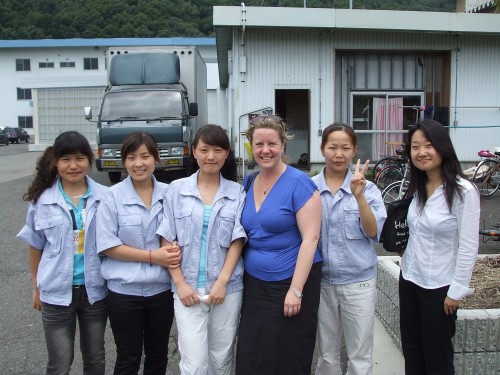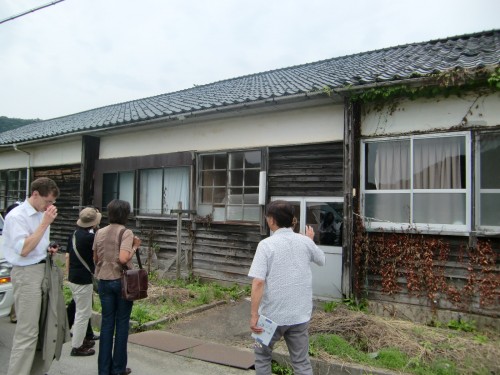
Just two months after Japan got burned in the US State Department’s 2010 Human Rights Report, a new paper pins the country’s foreign trainee program as being almost as close as you can get to state-sanctioned labor trafficking.
According to the 2011 Trafficking in Persons report, the Industrial Trainee and Technical Internship Program run by JITCO, provides no protection against “debt bondage, restrictions on movement, unpaid wages and overtime, fraud, and contracting workers out to different employers”. The report says that the majority of those who participate are from China, and in some cases pay fees of more than $1,400, and deposits of up to $4,000, to brokers in order to apply for the program. Minimum wage in China varies between US$100 and $200 per month.
The report cites a 2010 survey of Chinese trainees, saying that deposits are regularly seized by brokers if trainees report mistreatment or try to quit the program, and that some have reported having passports taken to prevent escape–the tell-tale signs of human trafficking that are often seen in sex trafficking cases.
JITCO trainees can be found in any industry, from farms and fisheries to textiles and apparel.
Criticism against the JITCO program are nothing new. Last year it was revealed that, in 2009, 35 Asian trainees on the program died–16 of “heart and brain ailments”, five in workplace accidents and one by suicide.



In 2009, a member of Polaris Project Japan visited the Rights of Immigrants Network in Kansai and spoke to two Chinese women who had fled the companies they had joined under the JITCO trainee program. Both women had payed Chinese brokers expensive fees and deposits only to work excessive overtime for low pay and received little of the JITCO-promised training. Both had protested, requesting better working conditions.
According to the Polaris Project report, one woman had come to the shelter after being beaten by her employer and hospitalized. According to the worker, the company had prohibited trainees from possessing mobile phones, but she managed to persuade the president to allow trainees to have them after being with the company for a year and a half. The woman believes she was beaten because one day the company president saw her with a mobile, but refused to give him the number because it belonged to a friend.
The second woman had reportedly been working 16-hour days for low wages at a small electronics subcontractor. According to the report, she had to arrive at the company at 8.45am to clean the machines before a 9am start, then was given a 1.5 hour dinner break at 6pm before heading back for overtime. She had paid a Chinese broker US$7,000 to join the program, and the company threatened to send her back to China when she complained about working conditions.
The Polaris Project Japan member who visited the two women identified a number of fundamental problems with the program: a lack of regulation, a lack of monitoring, disallowing trainees to choose or change their place of employment, providing employment with small firms looking for cheap labor, giving trainees no cover under Japanese labor law for their first year, and providing no system for trainees to solve workplace disputes.
The report labels Japan as a “Tier 2” country, as a nation that doesn’t meet the Trafficking Victims Protection Act‘s minimum standards, but are making efforts to become compliant.
But, the report says, although issues of human trafficking for sex have risen in profile within recent years, forcing the government to take some action, the Japanese government has yet to officially recognize the problem of forced labor, and have “made inadequate efforts to address abuses in the foreign trainee program despite credible reports of mistreatment of foreign workers.” The report cites a lack of law enforcement against forced labor crimes and says the government has yet to identify any victims of forced labor.
Japan nailed a Tier 2 status not only for its neglect of labor trafficking issues, but also for its handling of sex trafficking: “Japan’s victim protection structure for forced prostitution remains weak given the lack of services dedicated specifically to victims of trafficking.”
No Brazil, o tráfico de mulheres é uma constante. Aliciadas com promessas de ganhar muito dinheiro, mulheres são iludidas e viajam para o exterior e lá viram escravas sexuais. Notadamente na Europa, e também ja houve registro de casos no Japão! Li no livro “TOKYO PROIBIDA” a reportagem que voce, Jake-San fez acerca desse grave assunto!
Japan is flirting with another Earthquake. We live in a dual World. Part of our World is material and part is spiritual. This century is designed to herald in Peace on Earth. The #1 obstacle to Peace on Earth is to end Domestic Violence as the root of all violence. Violence will not be tolerated in the New Spiritual World.
So Mote It Be
Given that in the future Japan will be really needing foreign labor to compensate for its ageing population, it would be in the nations own interests to stop this kind of practices, and put effort into making Japan into a country that’s more inviting to come work in as a foreigner.
If Japan doesn’t take care of the rights of its foreign workforce then it might find it difficult to persuade workers come there when it needs them, and as the living standards in the rest of Asia are getting better.
O Governo Japonês (nihon) devia treinar mais e mais pessoas para elidir esse tráfico de mulheres. Não acho que recuros de outros Países, tem que ser necessário, uma vez que o Japão é uma super Potência. E isso acontece no País porque o governo Japones fecha os olhos para a realidade! Cdê a Polícia?
I just think that the govt must limit the number of trainees coming to Japan. Japan has sufficient labor market. Just look at the balooning Jdescendants. Notwithstanding the new breed of Nikkeis who are the offsprings of foreign men and women who married Jcitizens. Accepting a lot of trainees just add up to the deterioration of employment services. The one thing that is improving are the pockets of brokers. I have come to work with some wonderful trainees. Some resort to marriage scam or overstay just so they can stay here and work. Good thing for them but bad news for us since they contribute to the rat maze we’re already in.
What am I missing here? It sounds like JITCO is offering a coveted opportunity to these workers. In fact, it’s so coveted that the Chinese brokers are creaming off a few thousand dollars for each worker. Why doesn’t JITCO simply refuse to work with these brokers? Are the brokers operating secretly or giving kickbacks to JITCO? Either way, sounds like the corruption is centered in the Chinese brokers, not JITCO…
JITCO is just as guilty if they don’t make proper efforts to regulate or monitor the program.. What I don’t understand with this case, along with traditional sex trafficking, is why word-of-mouth hasn’t discouraged more people. Are Eastern European women or Chinese youth so desperate they’re willing to take the risk despite the horror stories, or do no horror stories get passed around?